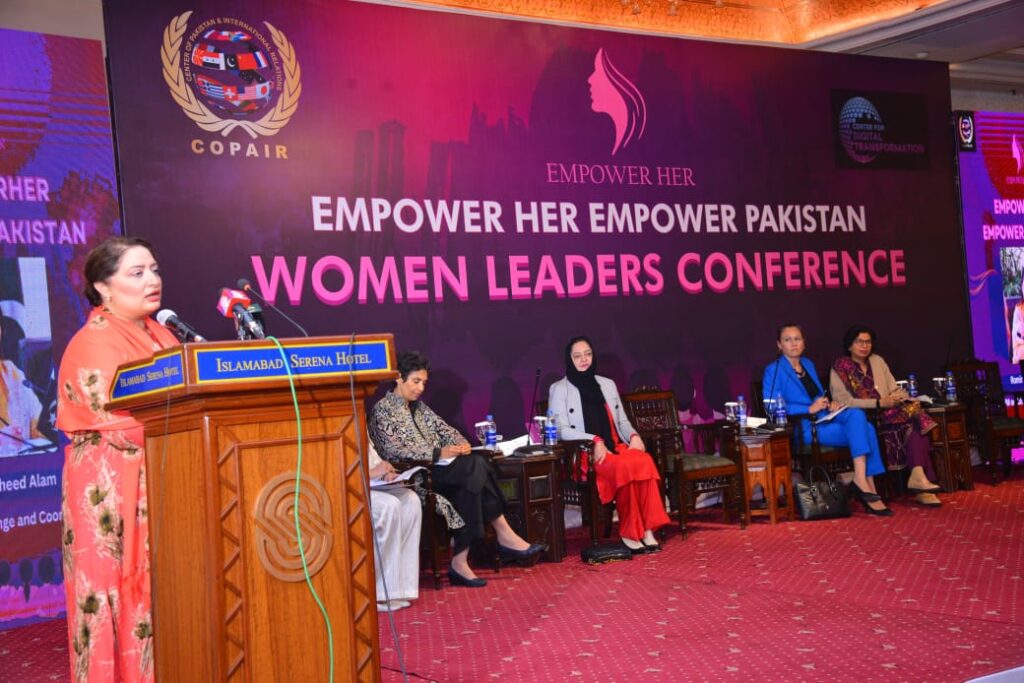
Islamabad : –The Empower Her, Empower Pakistan Women Leaders Conference successfully concluded in Islamabad, bringing together policymakers, global leaders, gender experts, and business professionals to drive forward discussions on women’s empowerment, policy advocacy, and international cooperation. The event played a pivotal role in enhancing Pakistan’s soft image by showcasing progressive initiatives and fostering global partnerships for gender equity.
The conference commenced with a recitation from the Holy Qur’an and the national anthem, setting the tone for a powerful day of dialogue. Amna Munawwar Awan, President of Empower Her & COPAIR, in her opening remarks, emphasized that “Empower Her, Empower Pakistan is not just a slogan; it’s a movement designed to create real opportunities for women in leadership, business, and the digital economy.” Saima Amjad, Advisor on the Empower Her Program, and Dr. Tahseen Nisar, Advisor COPAIR, provided an overview of the initiative, highlighting its impact on policy and grassroots empowerment.
The opening ceremony featured influential voices advocating for gender equity. Fauzia Viqar, Federal Ombudsperson FOSPAH, stressed the importance of workplace safety, stating that “ensuring protection against harassment is fundamental to creating safe and inclusive workspaces for women across Pakistan.” Ambassador Dilshad Senol underscored the global perspective, asserting that “women’s leadership is not just about equality—it’s about building a stronger, more progressive world for all.” Dr. Amna Noor Malik, Managing Director of the Higher Education Commission, highlighted the role of education, stating that “higher education plays a pivotal role in equipping women with the skills and knowledge to break barriers and lead with confidence.”

PM Aide on Climate Change and Coordination, Romina Khursheed Alam, emphasized the intersection of gender and climate justice, adding that “women are at the forefront of climate resilience—empowering them is crucial for sustainable development.”
The conference proceeded with thought-provoking panel discussions that tackled key issues related to gender rights, economic empowerment, and digital inclusion. The first panel discussion, moderated by Tanzeela Mazhar, focused on policy advocacy and international cooperation for gender rights. Ammara Durrani, Assistant Resident Representative at UNDP, stressed that “gender equality is at the heart of sustainable development—without it, we cannot achieve true progress.” Fahmida Khan, Gender and Development Specialist at UNICEF, echoed similar sentiments, highlighting that “investing in girls’ education and empowerment is key to transforming communities and economies.” Saman Ahsan, Portfolio Manager for Ending Violence Against Women at UN Women, asserted that “ending violence against women requires collective action, strong policies, and an unwavering commitment to justice.” Dr. Farzana Bari, Gender Expert, emphasized that “policy reforms and grassroots advocacy must go hand in hand to create lasting gender equity.” Barira Hanif, Gender Specialist at the Ministry of Planning, Development & Special Initiatives, added that “women’s empowerment must be embedded in national development policies to ensure sustainable progress.”
The second panel discussion, moderated by Sumaira Khan, focused on gender digital, financial, and economic empowerment. Abida Razzaq, Senior Vice President of ZTBL, highlighted financial barriers faced by women, stating that “financial inclusion is a game-changer for women’s empowerment in Pakistan.” Fajer Rabia, Advisor to SAPM on Education, stressed that “education is the foundation of empowerment—when we educate a woman, we empower a nation.” Syeda Huma Batool, CEO of Alvir Airlines, shared her experience in breaking industry stereotypes, asserting that “breaking barriers in male-dominated industries is proof that women can excel in every field.” Dr. Mehreen Afzal from NCERT spoke about the need for digital inclusion, stating that “women’s digital inclusion is the key to building an innovative and future-ready Pakistan.”

A special address was delivered by MNA Amna Batool , focal person of the Prime Minister’s Youth Program, who emphasized the role of young women in national progress, stating that “the youth of Pakistan, especially young women, are the driving force of our nation’s future. We must provide them with equal opportunities to thrive.” This was followed by a session featuring messages from global partners, highlighting international collaborations and future prospects for gender equality initiatives.
A significant milestone of the conference was the launch of the Gender Policy Framework 2.0, presented by Amna Munawwar Awan, which sets a new direction for gender-inclusive policies in Pakistan. Also the key stake holders ensure support for “Empower Her Empower Pakistan Program for empowering 1 Million women in political , economic and digital empowerment.The event concluded with an inspiring address by Justice Ayesha A. Malik, Pakistan’s first female Supreme Court judge, who reaffirmed the importance of legal empowerment, stating that “legal empowerment of women is the cornerstone of a just and equitable society. Ensuring gender-sensitive legal frameworks is crucial for sustainable progress.”
The conference resulted in key policy recommendations, including the need for strengthening legal frameworks to ensure workplace safety and protection against harassment, expanding financial inclusion initiatives to support women entrepreneurs, increasing digital literacy programs to bridge the technology gap, advocating for gender quotas in leadership positions, fostering global partnerships to implement best practices, and integrating women’s leadership into climate action policies.
Through its robust discussions and high-level participation, the Empower Her, Empower Pakistan Women Leaders Conference successfully projected Pakistan’s commitment to gender empowerment, reinforcing the country’s position as a progressive nation fostering women’s leadership and development. The conference not only set a transformative policy direction but also established a strong foundation for international collaboration in advancing gender equality.